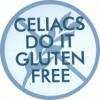-
Welcome to Celiac.com!
You have found your celiac tribe! Join us and ask questions in our forum, share your story, and connect with others.
-
Celiac.com Sponsor (A1):
Celiac.com Sponsor (A1-M):
-
Get Celiac.com Updates:Support Our Content
Gluten Free Sake
-
Get Celiac.com Updates:Support Celiac.com:
-
Celiac.com Sponsor (A17):
Celiac.com Sponsor (A17):
Celiac.com Sponsors (A17-M):
-
Recent Activity
-
- Manaan2 replied to Leslie Clark's topic in Gluten-Free Foods, Products, Shopping & Medications7
Hidden Gluten in distilled vinegar
Hi Trents-Thanks for reading and sharing insight. We need all the help we can get and it's super appreciated. She is currently dairy, soy and oat free and those have mostly been completely excluded from her diet since the diagnosis (we tried going back on dairy and oats at different times for a bit, didn't see a significant difference but have now cut out... -
- Jordan23 replied to tennisman's topic in Food Intolerance & Leaky Gut27
Potato Intolerance
Ok so know one knows about cross reactions from yeast,corn, potatoes, eggs, quinoa ,chocolate, milk, soy, and a few more I forgot. There all gluten free but share a similar structure to gluten proteins. I use to be able to eat potatoes but now all of a sudden I was stumped and couldn't figure it out when I got shortness of breath like I was suffocating.... -
- K6315 replied to K6315's topic in Related Issues & Disorders5
Newly gluten free… withdrawal?
Hi Lily Ivy. Thanks for responding. Did you have withdrawal? If so, what was it like and for how long? -
- trents replied to Doris Barnes's topic in Gluten-Free Foods, Products, Shopping & Medications1
Can I trust the gluten free label if a product was made in a facility that also processes gluten?
Welcome to the forum, @Doris Barnes! You do realize don't you that the "gluten free" label does not mean the same thing as "free of gluten"? According to FDA regulations, using the "gluten free" label simply means the product does not contain gluten in excess of 20 ppm. "Certified Gluten Free" is labeling deployed by an independent testing group known... -
- Doris Barnes posted a topic in Gluten-Free Foods, Products, Shopping & Medications1
Can I trust the gluten free label if a product was made in a facility that also processes gluten?
Buying choclate, I recently boght a bar from Hu Kitchen (on your list of recommended candy. It says it is free of gluten. However on the same package in small print it says "please be aware that the product is produced using equipment that also processes nuts, soy, milk and wheat. Allergen cleans are made prior to production". So my question is can I trust...
-



Recommended Posts
Archived
This topic is now archived and is closed to further replies.